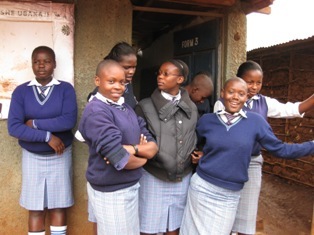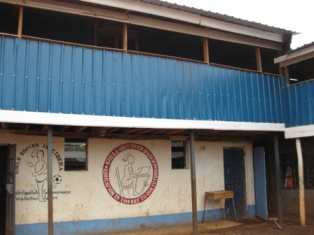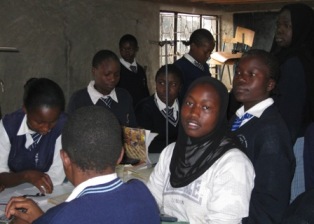 Buried deep inside the sprawling maze of Kibera, sub-Saharan Africa's largest slum, you'll find a hidden gem. Much more than a school, Kibera Girls Soccer Academy (KGSA) is a beacon of hope and opportunity for its beneficiaries, and a stellar example of a community-based initiative that is making a huge difference in the lives of disadvantaged girls.
Buried deep inside the sprawling maze of Kibera, sub-Saharan Africa's largest slum, you'll find a hidden gem. Much more than a school, Kibera Girls Soccer Academy (KGSA) is a beacon of hope and opportunity for its beneficiaries, and a stellar example of a community-based initiative that is making a huge difference in the lives of disadvantaged girls.
Walking through the winding paths of Kibera, it is instantly clear that Abdul Kassim is a respected leader among his community. We can't walk for more than a minute without stopping to greet passersby. Abdul grew up in the Kibera slum, but he was fortunate to be raised by his grandmother, who emphasized the importance of education and sent him to a private school. Five years ago, Abdul started KGSA in response to the desperate need to educate girls in Kibera. In Kenya, primary education is free and compulsory, but continuing on to secondary school is beyond the reach of most poor families, which cannot afford the costs of tuition and uniforms. Girls suffer from this cruel reality disproportionately more than boys, as many families will prioritize sending their sons to school over their daughters.
 Initially began as a soccer club to provide recreation and enrichment opportunities to girls in Kibera, it quickly evolved into a secondary school where girls from desperately poor families could be educated for free. Abdul noted the need for further education opportunities when he found several girls from his soccer club getting pregnant and engaging in risky behavior. These were smart girls, and he saw education as their best chance to transcend their circumstances. In five years, KGSA has passed 266 girls through their high school. Their current enrollment is at 130 girls, ages 14 to 18, across four grade levels.
Initially began as a soccer club to provide recreation and enrichment opportunities to girls in Kibera, it quickly evolved into a secondary school where girls from desperately poor families could be educated for free. Abdul noted the need for further education opportunities when he found several girls from his soccer club getting pregnant and engaging in risky behavior. These were smart girls, and he saw education as their best chance to transcend their circumstances. In five years, KGSA has passed 266 girls through their high school. Their current enrollment is at 130 girls, ages 14 to 18, across four grade levels.
I am astounded by the fact that there are only four government schools in all of Kibera. With an estimated population of 1.2 million, and 60 percent of this population consisting of children and youth, the majority of residents have to rely on privately operated schools. A secondary school where girls can be educated at no cost to their families, not even for uniforms, is unheard of.
Each student at KGSA must come from dire circumstances, where this school is really their only option to continue education. As a result, all of the girls are eager to learn and dedicated to their studies. There are hardly any discipline problems. You can see their enthusiasm for studies upon walking through their surprisingly well-appointed classrooms. I walk into the science lab and am immediately drawn to Beatrice, a 17-year-old in grade 11, who tells me that she wants to be a lawyer and a journalist. A quick survey of the 50 or so students in the cramped lab reveals that business studies, history, physics and math are among the favorite subjects. Abdul proudly tells me how his girls are getting higher exam pass rates than the average at government schools.
 The school operates on a truly shoestring budget. Abdul has a good job as a telecoms engineer in Nairobi, and he runs the academy in his free time. Their 12 teachers are all volunteers from the community, most of them with university education, and this is their primary "employment." They receive small stipends when there is funding, but this is often a struggle. Abdul laments that well-wishers and foreign donors usually prefer to donate once-off supplies, books or uniforms rather than sustain long-term programming. Even $50 a month per teacher would be a vast improvement for them.
The school operates on a truly shoestring budget. Abdul has a good job as a telecoms engineer in Nairobi, and he runs the academy in his free time. Their 12 teachers are all volunteers from the community, most of them with university education, and this is their primary "employment." They receive small stipends when there is funding, but this is often a struggle. Abdul laments that well-wishers and foreign donors usually prefer to donate once-off supplies, books or uniforms rather than sustain long-term programming. Even $50 a month per teacher would be a vast improvement for them.
I am inspired by the action-oriented philosophy of Abdul and his team. To me, this is the intrinsic value of supporting grassroots, community-driven programs. They know the needs and challenges of their community best and are positioned to respond effectively and appropriately. Following the 2007 and 2008 post-election violence that affected Kibera and neighboring slums in a devastating way, KGSA introduced a small, micro-lending program for families of its students. Once schools reopened, Abdul noticed many of his students struggling to focus and declining in their school performance. Upon investigating, he found that many of the girls were suffering at home because their families had lost so much in the months of violence. Businesses had been looted and destroyed, shack dwellings were burned and robbed. KGSA began making small loans available to its students' families to restart their businesses and get their lives back to normal.
As our visit to the school draws to a close, I chat with a few elementary-school-aged boys that are lingering around the outside the school. "Why aren't you in school?" I ask, even though I'm fairly certain I know the answer. Their families can't afford the school fees this month. It strikes me just how fortunate these 130 girls at KGSA are to be receiving this excellent education. And then I think just how fortunate this world is to have people like Abdul, who could easily ride his wave of (relative) personal wealth and success but instead commits his life to uplifting his community in profound ways.
Click here for more information or to support Kibera Girls Soccer Academy.